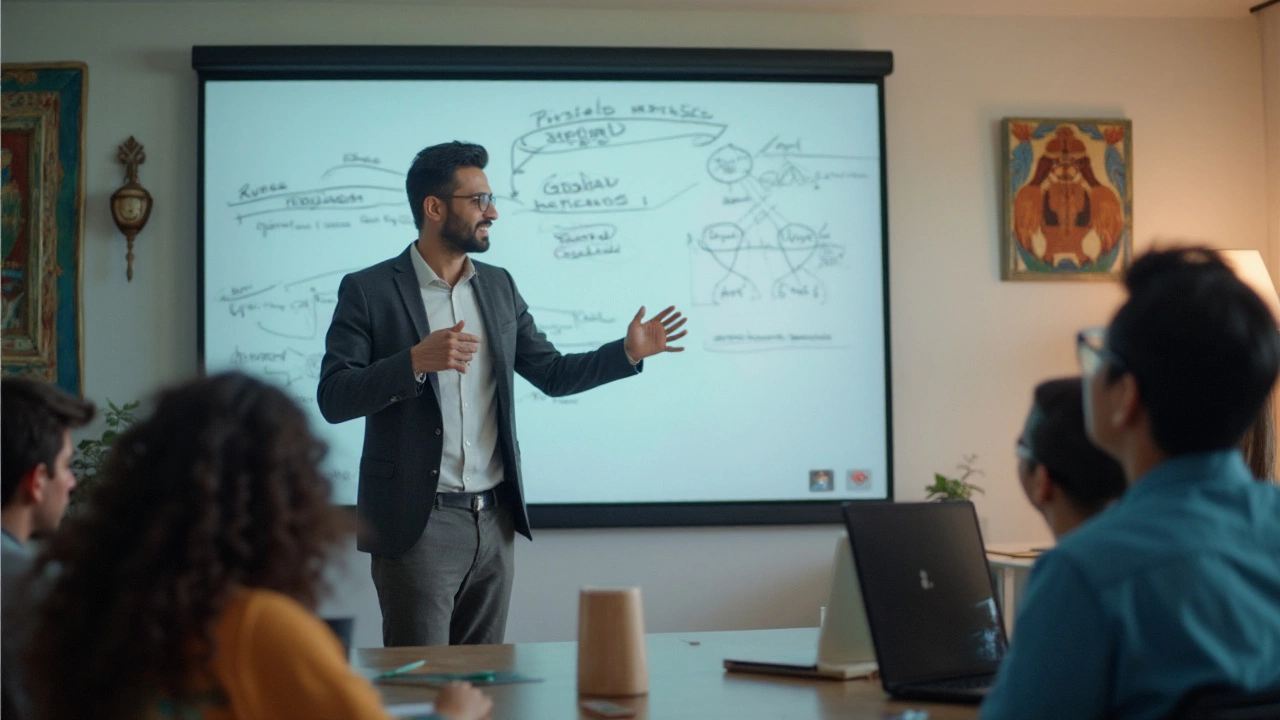Mastering Digital Marketing: Timeframes and Tips for Success
 Jan, 15 2025
Jan, 15 2025
Learning digital marketing opens doors to a dynamic and ever-evolving world where creativity meets technology. Whether you're looking to switch careers, enhance your business, or simply expand your skill set, knowing the time commitment involved is crucial. The landscape is broad, encompassing everything from SEO to social media, content creation to data analysis. Each of these areas requires varying levels of expertise and dedication.
This article offers insights into the different learning methods available, be it through structured courses, online tutorials, or hands-on experience. It also provides helpful tips on setting realistic goals and strategies to keep your skills sharp as the digital world continues to grow and change.
- Introduction to Digital Marketing
- Determining Your Learning Goals
- Different Learning Paths
- Timeframes for Various Approaches
- Tips for Effective Learning
- Staying Current in Digital Marketing
Introduction to Digital Marketing
In the vibrant realm of the internet, digital marketing serves as the anchor connecting businesses to the infinite pool of potential customers worldwide. This contemporary form of marketing utilizes online platforms and digital technologies, replacing traditional methods like print ads and billboards with more dynamic and personalized strategies. Companies utilize it to cultivate their brand presence, engage with consumers, and drive sales, making it a fundamental skill for the modern marketer. Digital marketing encompasses a vast array of techniques and channels including search engine optimization, content marketing, social media management, and paid advertising, each serving its unique purpose in the marketing mix.
The beauty of digital marketing lies in its ability to offer measurable results, a feature that today’s data-driven world greatly values. With tools like Google Analytics and Facebook Insights, marketers can track consumer behavior, website traffic, and conversion rates in real-time. This granular level of feedback equips businesses with the knowledge to pivot quickly and optimize their strategies effectively. According to a report by Statista, global digital advertising spending is projected to reach $646 billion by 2024, underscoring the growth and importance of mastering these skills in the digital age.
To grasp the full potential of digital marketing, it’s essential to understand the evolving consumer habits shaped by the digital transformation. More individuals than ever before are turning to their smartphones and computers for everything from shopping to entertainment and learning. This shift in consumer behavior necessitates adapting marketing strategies to meet customers where they spend most of their time. As Seth Godin, a renowned marketing expert, once stated,
"Marketing is no longer about the stuff that you make, but about the stories you tell."Creating engaging narrative-driven content is a cornerstone of successful digital marketing, aiming to foster a deep connection and sense of community with the audience.
Diversification within digital marketing methods means there's always something new to learn and implement, which can be both exciting and overwhelming for newcomers. While some might dive into online marketing through social media channels like Instagram or TikTok, others may begin with email marketing campaigns. Email marketing, despite being one of the older forms of digital outreach, maintains a strong return on investment, highlighted by the fact that for every dollar spent, the average return is $42. Understanding such nuances and trends allows marketers to make informed decisions based on their specific business goals and target demographics.
Determining Your Learning Goals
Before diving headfirst into the world of digital marketing, it's essential to establish clear and achievable learning goals. This foundational step not only directs your efforts but also helps in measuring your progress as you advance. The digital marketing domain is broad, and understanding your specific objectives will immensely help in tailoring your journey. For instance, some might be inclined towards enhancing their skills in SEO, while others might aim to master social media strategy or become proficient in content marketing strategies.
The key to setting effective learning goals starts with self-assessment and evaluation. It is important to ask questions like: What aspects of digital marketing am I most passionate about? What skills do I need to develop further in order to advance my career or business? Is there a specific area of online marketing that aligns with my interests and career prospects? Answering these questions will bring clarity and help prioritize which areas need immediate attention.
Prioritizing Skills and Knowledge
Once you have a clearer image of what you want, exploring different areas of digital marketing will shed light on where to focus your learning. Consider skills that have a direct impact on business outcomes, like analytics, which helps you quantify the effectiveness of marketing efforts. With these skills, you can make data-driven decisions that could improve your ROI. It is known that professionals equipped with both analytical skills and creative thinking are in high demand.
Setting both short-term and long-term goals is advisable, as it helps keep the learning process manageable and progress measurable. Short-term goals can include mastering a particular social media platform, while long-term aims might involve developing a comprehensive strategy that encompasses various facets of digital marketing.
Cathy Hackl, a leading expert in digital transformation, once said, "The skills we choose to develop today may determine how well we adapt to future technological advancements."
This emphasizes being current with trends and willing to learn continuously. As you set your learning goals, consider that the industry is always evolving, and being adaptable will always serve you well.
Balance Theory and Practice
Finally, balancing theoretical knowledge with practical application is fundamental. Choose learning paths that offer both theory and real-world instances. Interactive courses or mentorship programs where you can apply newfound knowledge to realistic scenarios can be particularly enhanced through live projects or internships. Engaging with hands-on projects is a vital part of learning, bridging the gap between theoretical learning and professional application. By enhancing what you learn through direct experience, you'll easier internalize concepts and understand their application in real-world settings.
| Area | Average Time to Master |
|---|---|
| SEO | 6-12 months |
| Social Media Marketing | 3-6 months |
| Content Creation | 3-9 months |

Different Learning Paths
When venturing into the realm of digital marketing, one quickly realizes that the journey is as diverse as it is rewarding. There are numerous pathways to gaining proficiency, each with its distinct merits and challenges. The path you choose should align with your personal goals, learning preferences, and time availability. In our digital age, countless educational resources cater to various learning styles, making it possible for everyone to find their niche in this expansive field.
For some, self-study provides the most flexible option. Resources abound, from ebooks and blogs to podcasts and webinars. A wealth of free information is available, covering every aspect of marketing from SEO to social media strategies. This route suits those who thrive on independent learning and enjoy the freedom to explore subjects at their own pace. It requires discipline and motivation as the wealth of information can be both empowering and overwhelming.
Alternatively, structured online courses or certification programs offer an organized curriculum. Platforms like Coursera, Udemy, and Google offer a range of digital marketing courses tailored to different expertise levels. These courses often include video lectures, quizzes, and assignments to provide a comprehensive understanding. Many of these programs are designed by industry experts and offer certification upon completion, which can enhance resume credibility.
For a blend of theoretical knowledge and practical experience, consider enrolling in a more traditional educational setup. Universities and colleges worldwide now offer specialized degrees in digital marketing. These programs are ideal for those who prefer face-to-face interactions and access to faculty expertise. They provide a more in-depth exploration and understanding of digital marketing strategies, consumer behavior, and analytics.
On-the-job training through internships or entry-level roles also presents a viable path to acquiring digital marketing skills. Real-world experience is invaluable and allows for the application of theoretical knowledge in practical settings. This route provides an opportunity to work under mentors, gain feedback, and hone skills in a professional environment. It fosters hands-on learning, making it particularly beneficial for those who grasp concepts more effectively through practice.
"The only source of knowledge is experience." — Albert Einstein
Each of these pathways requires a different time commitment and level of dedication. It's crucial to weigh your options, consider what aligns with your personal learning style, and choose a path that best suits your long-term career aspirations. The world of digital marketing is vast and filled with opportunities for those eager to dive in and explore.
Timeframes for Various Approaches
The journey of learning digital marketing can vary significantly depending on the approach you choose. Each method comes with its own set of timelines and benefits that cater to different learning styles and needs. If you opt for a formal education route through universities or colleges, expect to invest anywhere from one to four years. These programs are comprehensive, covering a wide range of digital marketing aspects including theory, practical projects, and often internships. Such an in-depth dive ensures robust knowledge and a recognized qualification at the end.
"Continuous learning is the minimum requirement for success in any field." – Brian Tracy
For those preferring a faster, self-directed route, there are myriad online courses. Platforms like Coursera, Udemy, and HubSpot offer targeted courses which you can complete in three to six months, part-time. These courses focus on specific skills within digital marketing, such as SEO, online marketing strategies, or social media management. They're perfect for those looking to enhance a particular skill or handle specific parts of a marketing strategy in a relatively short time frame.
Bootcamps present another efficient option with highly condensed, immersive learning. Lasting anywhere from six to twelve weeks, these programs are intensive and often simulate real-world marketing scenarios, offering invaluable hands-on experience. Here, participants engage with group projects, allowing them to apply theoretical knowledge practically. These bootcamps are excellent for fast-tracked learning, especially for career switchers eager to dive into the industry quickly.
Learning by Doing: The Hands-On Approach
Some learners thrive best through hands-on practice. Internships or entry-level jobs in the digital marketing field allow you to learn directly in a professional environment. While there is no fixed timeline here, the experience you gather over months or years can be immensely valuable. Immersing yourself in workplace dynamics, handling projects, working with tools, and observing experienced marketers can fast-track your understanding and skillset. This 'earn while you learn' approach can yield profound gains, although the learning curve might be steeper.For those balancing learning with other commitments, an informal or part-time study outside structured programs is feasible. You might spend anywhere from six months to a couple of years mastering skills at your own pace through reading, online tutorials, and experimentation.
| Approach | Timeframe |
|---|---|
| University/College Program | 1-4 years |
| Online Courses | 3-6 months |
| Bootcamps | 6-12 weeks |
| Internships/Hands-on Practice | Flexible |
The key to succeeding in learning marketing courses lies in choosing the approach that best aligns with your personal and professional goals, as well as your preferred style of learning. Balancing hands-on practice with structured learning while keeping the pace that suits your lifestyle can make the journey enjoyable and rewarding.

Tips for Effective Learning
Becoming proficient in digital marketing requires more than just soaking up information; it demands a strategic approach to learning, one that adapts to the field's fast-paced nature. Begin by setting clear and concise goals—knowing what you want to achieve can significantly streamline your learning journey. Is it search engine optimization that piques your interest, or perhaps the art of social media engagement? Focusing on specific niches can prevent burnout and give you a strong foundation.
Engage with well-structured digital marketing courses that offer practical experience alongside theoretical knowledge. Hands-on practice is crucial. Platforms like Coursera, LinkedIn Learning, and HubSpot Academy provide valuable resources, often coupled with real-world projects or case studies to work on. Don’t just watch or read—apply what you learn immediately to see its practical impact. This method can solidify your understanding and improve your retention of theories and techniques.
Community engagement is another vital strategy. Join forums, attend webinars, and participate in online discussions to be part of the digital marketing fraternity. These platforms not only offer support but also keep you updated on industry trends. According to a recent study, active learners retain knowledge 30% more effectively than those who study in isolation.
For many successful marketers, maintaining a learning journal has proven beneficial. Documenting what you learn, challenges faced, and progress made provides a reflective learning experience. This practice not only reinforces your learning but also serves as a motivational tool. When things get tough, looking back at your journal can remind you how far you’ve come.
It is also important to stay abreast of the latest technological advancements and updates in the field. In digital marketing, algorithms change frequently, and what works today might not work tomorrow. Always be on the lookout for new tools that can enhance your skills. Services like Google Alerts or subscribing to newsletters from reputable digital marketing sites can ensure that you receive the most recent information.
“Education is the kindling of a flame, not the filling of a vessel.” – Socrates. This notable insight applies perfectly to digital marketing, suggesting that constant engagement and curiosity are key drivers of effective learning.
Lastly, don't underestimate the power of feedback. Regularly seek feedback on your strategies and implementations from experienced professionals or mentors in the field. Constructive criticism can highlight your strengths and identify areas for improvement, ultimately guiding you to become an effective digital marketer.
Staying Current in Digital Marketing
In the fast-paced world of digital marketing, staying updated with the latest trends and technologies is not merely an option—it's a necessity. The digital landscape is like a river in constant motion; new tools and strategies are introduced regularly, making it vital for marketers to keep their fingers on the pulse. This continuous evolution can be both exciting and overwhelming, but with the right approach and mindset, marketers can remain agile and competitive.
Firstly, attending industry conferences and webinars can significantly enhance one's knowledge base. Such gatherings offer a chance to network with peers and experts, exchange ideas, and learn about new technologies. Webinar platforms are particularly advantageous for those who cannot physically attend events due to geographical constraints. In fact, many professionals highlight the importance of lifelong learning to stay ahead.
Forbes notes, "Digital marketing is no longer about merely advertising, it’s about creating meaningful relationships."Such insights from industry leaders provide valuable perspectives that can shape effective marketing strategies.
Secondly, subscribing to industry newsletters and leading blogs can serve as an excellent resource for regular updates. Publications like Marketing Land, HubSpot, and Moz deliver a wealth of information about industry trends, case studies, and thought leadership pieces. Online communities, like marketer forums or LinkedIn groups, are also thriving hubs where professionals discuss challenges, share advice, and explore new ideas. Engaging in these platforms regularly ensures a constant influx of fresh ideas and insights.
Moreover, getting hands-on experience with new technologies can be incredibly beneficial. Many platforms offer free trials or educational versions, enabling marketers to experiment without the pressure of commitments. This tactile learning approach can unearth potential for new campaign ideas or optimize current strategies. For instance, exploring innovations in AI-powered tools can streamline tasks, personalize content, and enhance user engagement, all of which are crucial in modern campaigns.
In addition, measuring one's performance and adjusting tactics based on solid data is foundational in staying current and relevant. Tools like Google Analytics and other SEO-focused platforms offer deep dives into campaign performance and consumer behavior. Table below illustrates the significant increase in engagement metrics when content is adjusted based on analytical insights:
| Month | Engagement Rate Before Adjustment | Engagement Rate After Adjustment |
|---|---|---|
| January | 5% | 12% |
| February | 7% | 15% |
Finally, educational courses tailored for online marketing are invaluable. Websites like Coursera, LinkedIn Learning, and Udemy offer an array of courses that suit different expertise levels and areas of interest. Investing time in structured learning can help fortify knowledge and ensure marketers remain equipped to tackle new challenges. Staying current in digital marketing requires a proactive approach, but those who embrace these strategies can navigate the dynamic landscape with confidence and success.